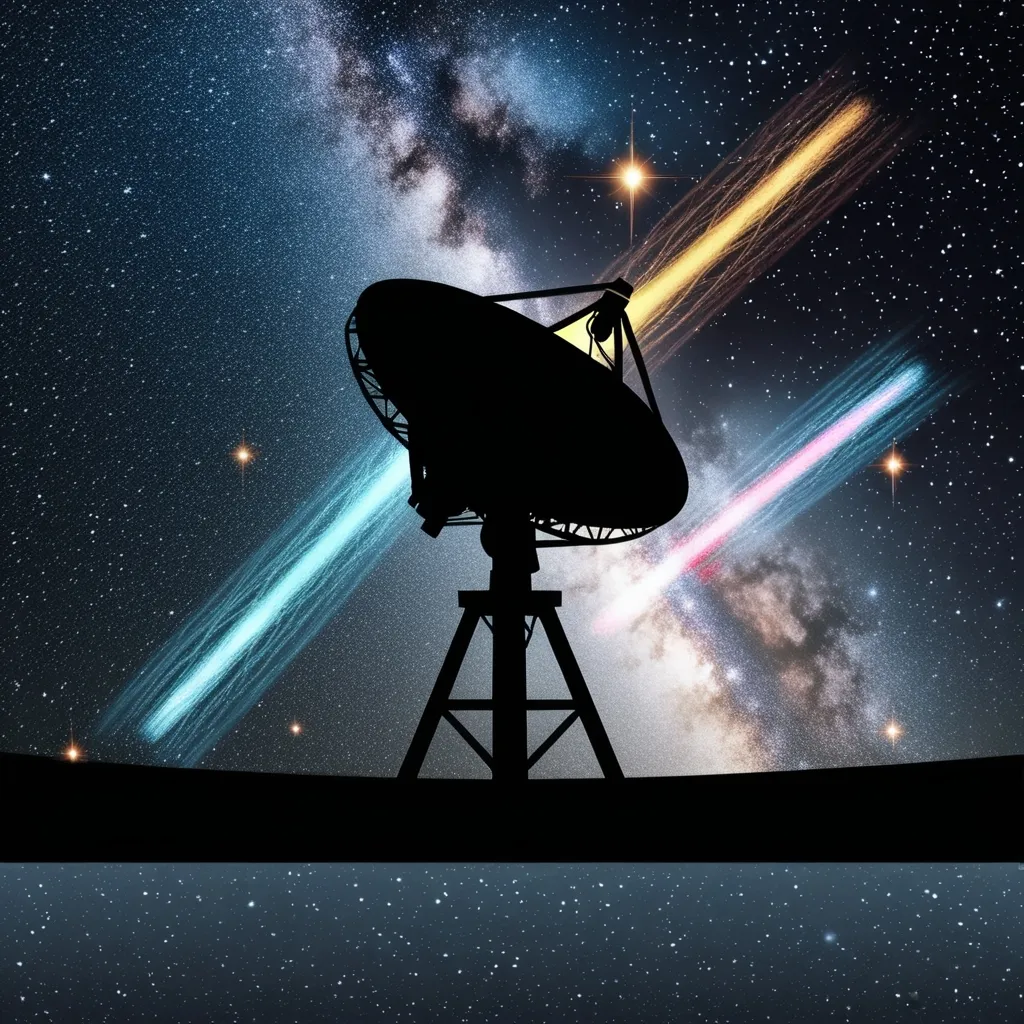The Universe’s Mysterious Radio Whispers: Are We Alone?
Ever stared up at the night sky and wondered if someone’s staring back? You’re not alone. For decades, scientists have been picking up bizarre radio signals from space that make us scratch our heads and ask, “What the heck was that?”
Let’s dive into this cosmic mystery and explore some of the weirdest signals we’ve caught so far. It’s like eavesdropping on the universe’s phone calls, except we have no idea who’s talking or what they’re saying.
Remember that time you thought you heard a ghost, but it turned out to be your neighbor’s cat? Well, scientists have their own “ghost” stories, but instead of cats, they’re dealing with things like neutron stars and magnetars. Fancy words for super weird space stuff.
The Wow Signal: When the Universe Said “Holy Cow!”
Picture this: It’s 1977, bell-bottoms are in, and a scientist at Ohio State University is chilling with a massive radio telescope. Suddenly, BAM! A signal so strong comes through that the guy literally writes “Wow!” on the printout. Talk about a cosmic mic drop.
This signal was the real deal. It lasted over a minute and came in on a frequency that screamed “artificial.” For a hot second, everyone thought we’d finally got a call from E.T. Spoiler alert: we hadn’t. But it’s still one of the coolest unsolved mysteries in space.
Scientists have been trying to explain this signal for years. Some say it was a comet having a bad hair day, others think it might have been Earth tech messing things up. The latest theory? A super magnetic star called a magnetar might have burped and lit up a hydrogen cloud. Sounds legit, right?
The Universe’s Broken Record: Signals That Won’t Shut Up
Fast forward to more recent times, and we’re still getting weird signals from space. In 2022, scientists picked up a signal from a galaxy so far away it makes your last road trip look like a walk to the mailbox. This signal is like that annoying song that gets stuck in your head – it keeps repeating over and over, super precisely, every fraction of a second.
Now, you’d think scientists would have this figured out by now, but nope. They’re scratching their heads, wondering if it’s a neutron star having a disco party or something even weirder. The jury’s still out on this one.
But wait, there’s more! In 2024, another signal decided to join the party. This one’s like a cosmic strobe light – bright flashes, weak pulses, and then total silence. Rinse and repeat every 53.8 minutes. It’s got scientists so confused they’re considering blaming it on space gremlins. (Okay, not really, but you get the idea.)
The 35-Year-Old Signal That Won’t Grow Up
Let’s talk about GPMJ1839-10. No, it’s not a new boy band. It’s a signal that’s been pulsing every 22 minutes for 35 years. That’s longer than some of us have been alive! It’s like the universe’s most persistent alarm clock, and we have no idea how to turn it off or why it’s even ringing.
This signal is so weird that even the wildest theories scientists can come up with fall short. It’s like trying to explain why cats are afraid of cucumbers – sometimes, the universe just doesn’t make sense.
SETI: The Ultimate Cosmic Hide and Seek
All these signals are part of a bigger game called SETI – the Search for Extraterrestrial Intelligence. It’s basically scientists asking, “Hello? Is anybody out there?” over and over again, hoping someone answers.
But here’s the catch – most of what we hear isn’t aliens trying to chat. It’s just the universe doing its thing, like cold gas clouds humming or electrons bouncing around in magnetic fields. What we’re really looking for are narrow, focused signals that could carry a message. Kind of like trying to hear a whisper in a hurricane.
The Long-Distance Call Problem
Here’s the thing about space – it’s big. Like, really big. Our own radio signals have only traveled about 100 light-years into space. That’s nothing in cosmic terms. By the time they get any further, they’re so weak they’re basically cosmic static.
So why bother listening for signals from other galaxies? Well, scientists figure if there’s anyone out there smart enough to send signals across the universe, they’re probably using some super-powerful, focused beams. They’d be aiming these beams right at us, like a cosmic spotlight.
Scientists are especially interested in signals on certain frequencies, like the hydrogen line. It’s like the universe’s universal language – if anyone’s trying to say hi, they might use this frequency.
The Human Side of the Cosmic Story
Let’s be real – part of why we’re so obsessed with these signals is that we’re all secretly hoping to make a new friend in the universe. The idea that we might not be alone out here is both exciting and a little scary.
Imagine if one of these signals actually turned out to be a message from an alien civilization. It would be like finding out that not only do your neighbors exist, but they’ve been trying to invite you over for coffee for years and you just never heard the doorbell.
Even if these signals turn out to be nothing but natural space noise, the search itself is pretty awesome. It’s pushing us to invent new tech, ask big questions, and dream even bigger.
The Never-Ending Story
So, what’s the deal with all these weird space signals? The truth is, we still don’t know. But that’s what makes it exciting. It’s like the universe is playing a giant game of Marco Polo with us, and we’re still trying to figure out the rules.
Every time we pick up one of these strange signals, it’s a reminder of how little we actually know about the universe. But instead of being discouraged, scientists get excited. Each new mystery is a chance to learn something new, to push the boundaries of what we thought was possible.
In the end, whether these signals turn out to be alien DJs or just really funky space weather, the search itself is the real adventure. It’s about asking questions, challenging what we think we know, and never stopping to wonder what’s out there.
So next time you look up at the stars, remember – somewhere out there, the universe is whispering. And who knows? Maybe one day, we’ll finally understand what it’s trying to say.






